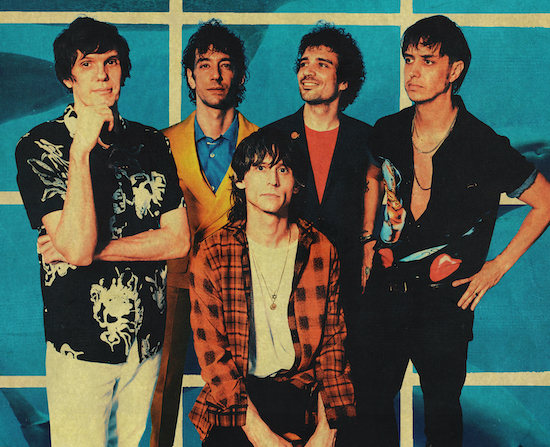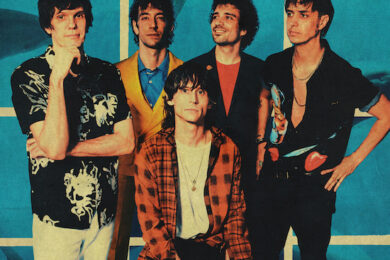It is almost as if the universe has been playing a cruel trick on The Strokes and enacting a poetic form of mirror punishment upon them. We all know the story by now. After shooting to fame by soaking up and regurgitating the music of a fondly remembered CBGBs scene of yore (The Velvet Underground, Talking Heads, Television, etc.), The Strokes have since been forced to wander the Earth under a curse of nostalgia, unable to shake off the albatross of the nifty collection of tunes that made up their iconic debut album.
In Meet Me In The Bathroom, Lizzy Goodman’s oral history of the 00s’ largely derivative New York rock scene (not the book’s actual subtitle), guitarist Albert Hammond Jr put it this way: “With [second album] Room On Fire, people were giving us shit because they said we were sounding too much the same. With the third album, we were getting shit that we don’t sound like Room On Fire. We got fucked by the same thing twice!” He’s right that The Strokes can’t win but, based on their interviews, they sure can moan.
Goodman’s book also features members of The Strokes reflecting that their initial burst of success made them extremely unhappy while they simultaneously express jealousy towards the popularity of The Killers, the slick Las Vegas band that apparently stole their thunder. Perhaps a symptom of the band members’ privileged backgrounds (a second unshakable hex which they are clearly sick of having to address), their penchant for grumbling and feeling hard done by is one unsavoury habit that The Strokes have never been able to shake. Even some of the band’s detractors will accept that The Strokes are “cool”, which helps to explain why they are well known while a thousand other acts from moneyed families are not. That being said, how many genuinely cool people complain as often as this lot do?
Vice Media co-founder Suroosh Alvi has this to say in Meet Me In The Bathroom: “For all the talk about The Strokes, how they fucked it up, that their records suck now, there is still no one cooler. They are still the last imprint of that particular brand of rock cool. They are the last real rock stars. And live, they’re still so spectacular. They don’t do anything, they just stand up there and kill it.” There are plenty of groups (both then and now, from the obscenely profitable to the heroically obscure) who get up on onstage and play their hearts out each night as if every single gig is the final one of their tour, or of the band’s career, or its members’ mortal lives, or the very last concert before this entire sorry planet is burned to a cinder. Now that is a cool way to operate. The Strokes were never one of those bands. As Alvi himself notes they didn’t really do anything, although he is slightly wrong about that too. The problem wasn’t that The Strokes didn’t do anything at all. They’re not exactly Kraftwerk or Stars Of The Lid. The problem was that they did very little, which is worse.
Those three guitarists, tall and aloof with their motions set to a self-conscious minimum, strumming away like their minds were somewhere else entirely. What food to have later? Which drugs are left over? The answer to seven-down in the Wall Street Journal cryptic crossword? Whatever it was, they didn’t exactly seem to be existing in the all-important NOW. Clad in those pitch-black sunglasses that serve as a literal barrier between him and the audience, Julian Casablancas hangs from his microphone like he can barely be bothered to stand upright let alone put on a serviceable rock show. Did The Strokes ever truly enjoy music, the act of making it and the thrill of playing it live? They didn’t seem to, most of the time. People may have thought the band members’ detachment and lack of enthusiasm came across as cool, but did The Strokes ever really LOVE music?
In recent years, they have loved being apart more than playing together, pursuing different side and solo projects and not even bothering to promote their last album together, 2013’s Comedown Machine. Enter Rick Rubin then, the hirsute 57-year-old producer known for weaving his magic in rejuvenating the creative energies of everybody from written-off country & western pensioners to worn-out rap superstars. Tom Petty once said that Rubin had pushed him harder than anyone else had dared to push him in years. Omar Rodriguez-López of The Mars Volta credited Rubin with teaching him that “every problem has a solution, no matter how big.” When pressed by Alexis Petridis in The Guardian the other week, this is what Julian Casablancas had to say on the subject: “It’s Rick Rubin, so … I don’t want to like, you know …”
Has Rubin finally met his Waterloo? Are The Strokes the one act that even he is unable to inject with an adrenaline hit to restore some enthusiasm? To their credit, the songs on The New Abnormal tend to hit a higher level of quality than last time around, albeit probably not enough to enable them to nudge out too many vintage tracks from The Strokes’ setlists. It’s doubtful that repeat listens will be hugely rewarding. Rubin’s production is rich and crisp, if a little cold and stiff, and it would’ve been nice to hear him fatten up the band’s signature lean and tinny sound.
Sharing something in spirit with Is This It’s first track, ‘The Adults Are Talking’ is a catchy and understated opener, almost lullaby-like in its gentleness. With its garishly cheap keyboard riff, ‘Brooklyn Bridge To Chorus’ plumps for 80s pastiche on the verses before, on the chorus, reverting back to the safety and security of the 70s. Over a New Order-y bassline, ‘Bad Decisions’ shamelessly rips off ‘Dancing With Myself’ (for which co-writers Billy Idol and Tony James are credited). The lush disco number ‘Eternal Summer’ spends over six minutes trying to channel Chic or Prince, although the mention of funny psychedelic journeys in its lyrics suggests they may have been listening to the playlist-friendly yacht-psych sound of Tame Impala.
Casablancas is at his best when he occasionally escapes the comfort zone of lethargic mumbling and gives it some extra welly, whether adopting a high-pitched falsetto, evoking Jarvis Cocker’s This Is Hardcore-era croon on ‘Not The Same Anymore’ or sounding weirdly like James Dean Bradfield on the opening lines of ‘Bad Decisions’. On the stripped-back and drum-free ‘At The Door’, Casablancas even begins to give the impression that he actually means what he’s singing.
For all everybody’s efforts though, the band still sounds tired. A recent London concert featured only two numbers lifted from The New Abnormal. The event took place prior to the release of the album but it still makes you wonder how much confidence The Strokes really have in their new material. Or whether they even like it. Let alone love it.



